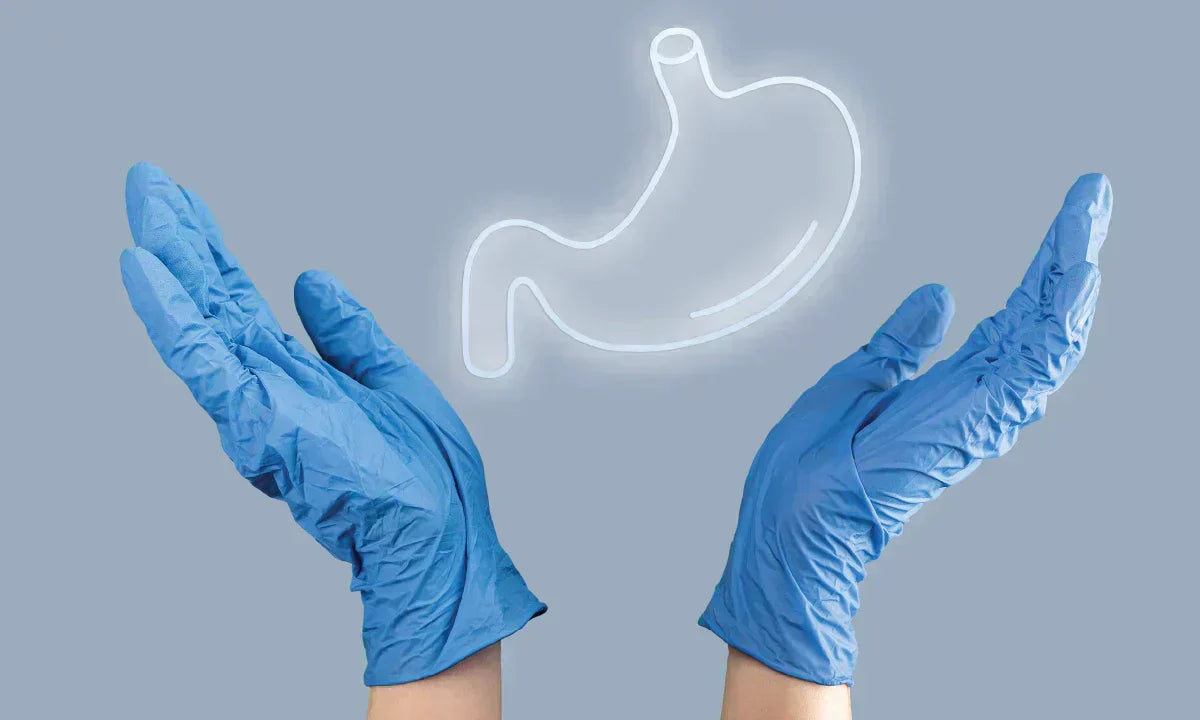Estimated Reading Time: 6 minutes
|Some meals feel easy. Others leave you bloated or heavy. The difference often comes down to digestion. Your body uses enzymes to break down food. But those enzymes can run low - with age, stress, or certain health issues. Digestive enzyme supplements give your system a little help, so meals are easier to handle, and nutrients are better absorbed.
In the sections ahead, we’ll explore how these supplements work, what they contain, and how they may contribute to better digestive health over time.
What Are Digestive Enzymes
Digestive enzymes are natural proteins your body makes to help break down food into nutrients.
Each one has its role:
-
Amylase breaks down carbs
-
Protease breaks down protein
-
Lipase handles fat
-
Lactase helps digest dairy
These enzymes get to work from the moment you start eating - from your mouth to your gut - making sure your body can use the food you put in.
Understanding Digestive Enzyme Supplements
These supplements are made to help the body break down food more easily and absorb nutrients better. They may help the digestive system handle carbohydrates, proteins, fats, and fiber more efficiently, which can lead to greater comfort after eating.
These supplements come from a variety of sources:
-
Animal sources include enzymes collected from the pancreas of pigs or cows. These typically provide amylase, lipase, and protease.
-
Plant sources include natural enzymes like bromelain from pineapple and papain from papaya. These are often used to support the digestion of protein.
-
Microbial sources involve enzymes produced using fungi or bacteria. These are popular in vegan formulations and are known for remaining effective in different digestive environments.
-
Digestive enzyme supplements are available in various forms, including capsules, tablets, powders, and chewables. Individuals experiencing occasional digestive discomfort, such as feeling bloated or overly full after meals, may consider these supplements to support their digestive process.
There are times when your body doesn’t seem to process food the way it should. You eat, but something feels off; maybe you feel bloated, or like the food just “sits” there. This could be due to a lack of digestive enzymes.
Your body uses these enzymes to help break down food. When that process slows or doesn’t happen fully, nutrients might not be absorbed the way they should. Over time, that can take a toll on how you feel and how well your body functions after meals.
What Happens When Enzymes Are Low
Enzyme insufficiency means your body isn’t producing enough of the substances needed to digest food properly. It can happen for different reasons - some people are born with it, while others develop it as they age or due to underlying health issues.
Here are a few examples:
-
Some people are born with a rare condition that makes it difficult to break down sugars in certain carbs. It’s called sucrase-isomaltase deficiency, and it can cause ongoing digestive problems if not identified.
-
Others may experience problems if their pancreas isn’t producing enough digestive enzymes. This is known as pancreatic enzyme insufficiency, and it can affect how the body handles fats, proteins, and carbohydrates.
-
A much more common situation is trouble with dairy. When your body doesn’t make enough lactase, which is the enzyme for breaking down milk sugar, you might feel discomfort after eating cheese, ice cream, or drinking milk.
-
In cases like these, digestive enzyme supplements are sometimes recommended. They’re not a cure, but they can help support digestion, especially when your body needs a little extra assistance.
Could You Be Low on Digestive Enzymes?
Sometimes, your body gives subtle hints that it’s not breaking down food as well as it should. Maybe you feel uncomfortably full or gassy after eating, even when your portions are modest. You might notice occasional cramping or loose stools, especially after a heavier meal.
Other times, clues show up in your bathroom routine. If your stool looks unusually oily or tends to float, it could mean your body isn’t absorbing fats properly. In some cases, people lose weight without trying, simply because they’re not extracting nutrients efficiently from what they eat.
Food sensitivities can also be a red flag. If dairy, for example, seems to trigger bloating or discomfort, your body might lack the enzymes needed to break it down, like lactase for lactose.
If any of this sounds familiar, it might be worth exploring whether enzyme support could make digestion easier and more comfortable for you
What Digestive Enzymes Can Help With
-
Break down food so it’s easier to digest
-
Ease bloating, gas, and heaviness after meals
-
Support better nutrient absorption
-
Take pressure off your digestive system
-
Can make rich or heavy meals feel easier
-
May help reduce leftover food in the gut that causes discomfort
-
Not a cure - but can offer real relief for some people
Why Digestive Enzymes Might Help
As we get older or deal with stress, our bodies may not make enough enzymes to break down food properly. Digestive enzyme supplements step in to help when your system needs a little support.
-
Better nutrient absorption: They help break down protein, fat, and carbs so your body can get more from what you eat - like vitamins and minerals. Lab studies show that enzyme blends can help break down food better, making nutrients easier to absorb.
-
Less bloating, more comfort: Enzymes can ease that heavy, full feeling after meals. Some people even sleep better when digestion improves.
-
Support for gut balance: By breaking down food more fully, enzymes may help reduce leftovers in the gut that feed the wrong bacteria - keeping things more balanced.
Early animal studies show that enzymes may help keep gut bacteria in better balance by breaking down leftover food that can cause trouble. Human research is still ongoing, but the results so far point to a possible role in supporting overall gut health.
They're not a cure, but for many, they make meals feel a lot easier.
Digestive Enzymes and Digestive Issues
Enzyme supplements don’t treat conditions, but they can help with certain digestive struggles.
-
Lactase can make dairy easier to handle if you're lactose intolerant.
-
Pancrelipase supports digestion in people with low enzyme output from the pancreas.
-
Multi-enzyme blends may ease bloating or discomfort in those with IBS or food sensitivities.
-
For celiac disease, enzymes aren’t a fix - but may help in case of accidental gluten exposure.
By breaking down food more fully, enzymes may also help reduce buildup in the gut and support better balance.
Summary
When your body isn’t making enough digestive enzymes, supplements can help. They may ease bloating, improve nutrient absorption, and support a healthier gut. They’re not a replacement for medical treatment, but they can make meals feel easier - and leave you feeling better after you eat.
Also Read: How Gut Health Affects Weight Loss
Disclaimer: This article is for informational purposes only and does not constitute medical advice. These statements have not been evaluated by the Food and Drug Administration. Digestive enzyme supplements are not intended to diagnose, treat, cure, or prevent any disease.
References
-
Redirecting. Elsevier.com. Published 2025. Accessed May 19, 2025. https://linkinghub.elsevier.com/retrieve/pii/S2405844024062819
-
Nishiyama H, Nagai T, Kudo M, et al. Supplementation of pancreatic digestive enzymes alters the composition of intestinal microbiota in mice. Biochemical and Biophysical Research Communications. 2018;495(1):273-279. doi:https://doi.org/10.1016/j.bbrc.2017.10.130
-
Singh MP, Agrawal NR, Sushant Saurabh, Krishna E, Singh JM. Exploring Therapeutic Digestive Enzyme Landscape in India: Current Evidence, Profit Motives, Regulations, and Future Perspectives. Curēus. Published online January 24, 2024. doi:https://doi.org/10.7759/cureus.52891
-
Ianiro G, Pecere S, Giorgio V, Gasbarrini A, Cammarota G. Digestive Enzyme Supplementation in Gastrointestinal Diseases. Current Drug Metabolism. 2016;17(2):187-193. doi:https://doi.org/10.2174/138920021702160114150137






































